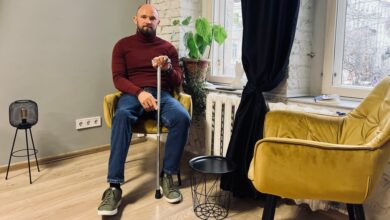Sleep disruptions in 30s, 40s linked to cognitive decline a decade later: study

People who have more interrupted sleep in their 30s and 40s are more than twice as likely to have memory and thinking problems a decade later, according to a new study.
In the early 2000s, the researchers tracked the quality of sleep for hundreds of people during two overnight visits about a year apart, capturing a total of six nights of sleep per person. Sleep quality was assessed using a wrist activity monitor that tracked the amount of sleep people got along with periods of movement to gauge sleep fragmentation, or short, repetitive interruptions of sleep. The participants were about 40 years old, on average, at this point in the study.
More than a decade later, between 2015 and 2016, the researchers analyzed the cognitive ability of 526 of the same participants using standardized interviews and tests of cognitive ability, including processing speed, executive function, memory and fluency.
On average, the study participants were found to sleep about six hours each night, and about a fifth of their sleep time was disrupted. Overall, people experiencing more sleep fragmentation, or with greater share of their sleeping hours spent moving, were more likely to receive poor cognitive scores on all of the tests more than a decade later.
Of the 175 people with the most disrupted sleep, 44 had poor cognitive performance 10 years later, compared with 10 of the 176 people with the least disrupted sleep, the study found.
The research was published Wednesday in Neurology, the medical journal of the American Academy of Neurology.
People who slept less or who had higher sleep fragmentation were significantly more likely to be male, to be Black, to have a higher BMI and to have a history of depression or hypertension.
Due to the small sample size, the researchers were unable to fully investigate potential race or gender differences. But after they adjusted for health factors and other demographics, people with the most disrupted sleep were found to be more than twice as likely to score worse than average on the set of cognitive tests compared with those who had the least disrupted sleep.
“Given that signs of Alzheimer’s disease start to accumulate in the brain several decades before symptoms begin, understanding the connection between sleep and cognition earlier in life is critical for understanding the role of sleep problems as a risk factor for the disease,” study author Dr. Yue Leng, an associate professor of psychiatry at the University of California, San Francisco, said in a news release.
Throughout the study, participants were also asked to keep a sleep diary, tracking bedtimes and wake times and assessing their own quality of sleep. However, objective measures of sleep duration and subjective assessments of sleep quality did not correlate to cognition in midlife.
“Our findings indicate that the quality rather than the quantity of sleep matters most for cognitive health in middle age,” Leng said.
People are supposed to get between seven and 10 hours of sleep each night, depending on their age. But 1 in 3 Americans don’t get enough, according to the US Centers for Disease Control and Prevention.
In addition, 50 million to 70 million Americans struggle with sleep disorders such as sleep apnea, insomnia and restless leg syndrome, which can ruin a good night’s shuteye.
The CDC calls that a “public health problem,” because disrupted sleep is associated with a higher risk of conditions including diabetes, stroke, cardiovascular disease – and dementia.
One study from 2021 found that people who reported routinely experiencing difficulty falling asleep had a 49% increased risk of dementia, while those who often woke in the night and had difficulty falling back asleep had a 39% increased risk of dementia. And a study published in October found that chronic loss of slow-wave sleep – the third stage of sleep, during which the body removes unwanted or potentially harmful materials from the brain – may increase the risk of dementia.
“More research is needed to assess the link between sleep disturbances and cognition at different stages of life and to identify if critical life periods exist when sleep is more strongly associated with cognition,” Leng said. “Future studies could open up new opportunities for the prevention of Alzheimer’s disease later in life.”
The study used a wrist monitor for research to assess sleep fragmentation, Leng told CNN by email. She noted there are consumer-grade wrist monitors available, like the Apple Watch and Fitbit, while Johns Hopkins’ Junxin Li, an associate professor who studies sleep and cognitive function, added that there are others including Garmin, Oura Ring and Dreem band.
Assessing sleep fragmentation in particular, though, which can involve “microarousals” a person may not even be aware of, is best done using electroencephalography, or EEG monitoring, said Dr. Maggie Soltis, an assistant professor of neurology and sleep medicine at Duke University. She noted, though, that “can cause sleep fragmentation in and of itself because you are now trying to sleep with a bunch of electrodes on your head trying to monitor your brainwave activity.”
The commercially available trackers, she said, can be helpful to look at trends.
The best way to address fragmented sleep, the experts said, is to try to identify the cause.
“If the fragmentation is due to sleep disorders like sleep apnea or restless leg syndrome, professional help is necessary,” Li said.
To improve sleep more generally, she recommended regular daytime exercise — while avoiding exercise close to bedtime — establishing a relaxing bedtime routine, reducing evening screen time, and avoiding large meals, caffeine, nicotine and alcohol in the evening.
It’s also important to sleep in a cool, dark, quiet room, and to aim to wake up at the same time every day, Soltis added.
“However, if you have an underlying sleep disorder, these sleep hygiene recommendations would likely not be sufficient to fix the bigger issue,” Soltis said. “That is why I believe talking with your doctor would be the most helpful (specifically setting an appointment to focus on and discuss sleep).”
CNN’s Meg Tirrell, Sandee LaMotte and Kristen Rogers contributed to this report.




